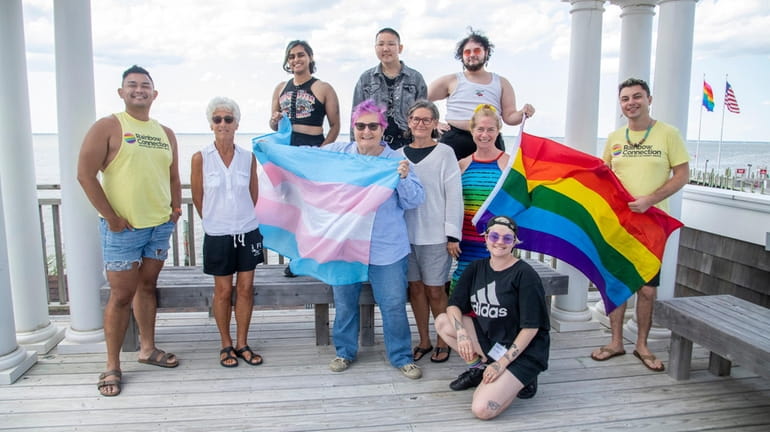At this Fire Island theater camp, members of the queer community share stories, celebrate arts

Rainbow Connection Summer Theater Program participants meet at Fire Island's Cherry Grove Community House and Theatre.
Credit: Rick Kopstein
Jack Lada was scared he'd lose his vocal range when he transitioned.
A singer, Lada, 22, of Ronkonkoma, reflected on his life-changing experience with peers at a Fire Island theater group recently, saying he values the "ability for queer people to tell our own stories."
"It took me a very long time to find my voice. But now that I have it, I am not going to shut up," Lada said.
Lada is among eight participants of the Rainbow Connection Summer Theater Program, a multigenerational group that meets in Cherry Grove for two weeks in August to produce an original variety show about queer rights and expression — issues that have taken on national significance amid an increase in legislation targeting the LGBTQ community. More than 520 anti-LGBTQ bills have been introduced in state legislatures so far this year and a record 70 have been enacted, according to the Human Rights Campaign.
Rainbow Connection was launched in 2021 to provide a "safe, affirming space" for LGBTQ elders over the age of 55 and those in their teens and early 20s to express themselves and build intergenerational relationships, said Adam Odsess-Rubin, 31, of Brooklyn, who is one of the program's counselors.
He highlighted the significance of hosting the camp at Cherry Grove, historically known as a sanctuary for the LGBTQ community, during a time when same-sex activity was criminalized in the country.
“Young people tell me Long Island is really conservative and they have a really hard time, and deal with bullying and isolation and family rejection and a lot of the things that come with growing up queer,” he said. “To hop on a ferry and come to this place where pretty much everyone is gay, and it's really inclusive and welcoming, is huge for them.”
The camp is hosted through the Arts Project of Cherry Grove, which was founded in 1948 and is the oldest known LGBTQ community arts organization in the country, according to the nonprofit's website. Sheila Morgan, director of development at the Arts Project and founder of Rainbow Connection, hopes the program will serve as an "incubator for emerging queer artists" and "help pass the baton" to a future generation.
The LGBT Network on Long Island also runs an intergenerational program year-round, said president and founder David Kilmnick, but such programs are "rare."
"What I have seen through the intergenerational programs that we run is that everyone learns from one another, better understands one another, which I think is important because sometimes the older generation may think that the younger generation just has it easy now, which is not the case, and the younger generation doesn't know our history because it's still not taught in schools," he said.
The group meets in the Cherry Grove Community House and Theater, a building eligible for the National Register of Historic Places for the role it played in shaping the hamlet that would evolve into what the National Park Service calls “America’s First Gay and Lesbian Town.”
“Being able to interact intergenerationally within the community was such an important thing because when you're a young, queer person, you don't necessarily see that,” said Samir Chopra, 22, of Brooklyn. “Being able to talk to people who've been through all of this and dealt with the same issues and even more than you have, and seeing that they're thriving here, is so important.”
Michael Butler, 65, of New York City, has been coming to Fire Island for 43 years. He said he doesn’t consider himself an artist, but he joined the program because he hopes to learn something new about the younger generation.
He has children and grandchildren, but lacks "any real connections to them" because “once you’re gay, you’re just an outcast.”
“In the Black community, that's a whole other dynamic. And then in the early stages, the gay community was not as open and welcoming,” he said.
Now, he said he’s “reveling in how connected we are, and how this younger generation is really showing the signs that I had hoped for in my youth.”
“It's a refreshing moment for me … I love the energies that I see in the room,” he said. “I was not that at age 22. I was nowhere near that.”
Jack Lada was scared he'd lose his vocal range when he transitioned.
A singer, Lada, 22, of Ronkonkoma, reflected on his life-changing experience with peers at a Fire Island theater group recently, saying he values the "ability for queer people to tell our own stories."
"It took me a very long time to find my voice. But now that I have it, I am not going to shut up," Lada said.
Lada is among eight participants of the Rainbow Connection Summer Theater Program, a multigenerational group that meets in Cherry Grove for two weeks in August to produce an original variety show about queer rights and expression — issues that have taken on national significance amid an increase in legislation targeting the LGBTQ community. More than 520 anti-LGBTQ bills have been introduced in state legislatures so far this year and a record 70 have been enacted, according to the Human Rights Campaign.
WHAT TO KNOW
- The Arts Project of Cherry Grove, the oldest known LGBTQ community arts organization in the country, has launched a theater camp for LGBTQ elders over 55 and youth in their teens and early 20s to provide a safe space for self expression and build intergenerational relationships.
- Rainbow Connection is among the few programs of its kind in the nation, said Adam Odsess-Rubin, one of the program counselors.
- Camp participants will produce an original variety show about queer rights and expression, to be performed Aug. 11 and Aug. 12.
Rainbow Connection was launched in 2021 to provide a "safe, affirming space" for LGBTQ elders over the age of 55 and those in their teens and early 20s to express themselves and build intergenerational relationships, said Adam Odsess-Rubin, 31, of Brooklyn, who is one of the program's counselors.
He highlighted the significance of hosting the camp at Cherry Grove, historically known as a sanctuary for the LGBTQ community, during a time when same-sex activity was criminalized in the country.
“Young people tell me Long Island is really conservative and they have a really hard time, and deal with bullying and isolation and family rejection and a lot of the things that come with growing up queer,” he said. “To hop on a ferry and come to this place where pretty much everyone is gay, and it's really inclusive and welcoming, is huge for them.”
The camp is hosted through the Arts Project of Cherry Grove, which was founded in 1948 and is the oldest known LGBTQ community arts organization in the country, according to the nonprofit's website. Sheila Morgan, director of development at the Arts Project and founder of Rainbow Connection, hopes the program will serve as an "incubator for emerging queer artists" and "help pass the baton" to a future generation.
The LGBT Network on Long Island also runs an intergenerational program year-round, said president and founder David Kilmnick, but such programs are "rare."
"What I have seen through the intergenerational programs that we run is that everyone learns from one another, better understands one another, which I think is important because sometimes the older generation may think that the younger generation just has it easy now, which is not the case, and the younger generation doesn't know our history because it's still not taught in schools," he said.
The group meets in the Cherry Grove Community House and Theater, a building eligible for the National Register of Historic Places for the role it played in shaping the hamlet that would evolve into what the National Park Service calls “America’s First Gay and Lesbian Town.”
“Being able to interact intergenerationally within the community was such an important thing because when you're a young, queer person, you don't necessarily see that,” said Samir Chopra, 22, of Brooklyn. “Being able to talk to people who've been through all of this and dealt with the same issues and even more than you have, and seeing that they're thriving here, is so important.”
Michael Butler, 65, of New York City, has been coming to Fire Island for 43 years. He said he doesn’t consider himself an artist, but he joined the program because he hopes to learn something new about the younger generation.
He has children and grandchildren, but lacks "any real connections to them" because “once you’re gay, you’re just an outcast.”
“In the Black community, that's a whole other dynamic. And then in the early stages, the gay community was not as open and welcoming,” he said.
Now, he said he’s “reveling in how connected we are, and how this younger generation is really showing the signs that I had hoped for in my youth.”
“It's a refreshing moment for me … I love the energies that I see in the room,” he said. “I was not that at age 22. I was nowhere near that.”

